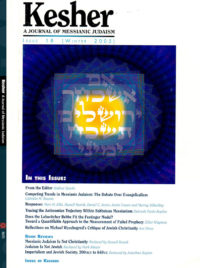From the Editor – Issue 18
By Andrew Sparks
This issue of Kesher includes additional articles and book reviews. Deborah Kaplan and Elliot Klayman explore the two most popular Messianic figures of the last four centuries. Both Shabbetai Zevi and the Lubavitcher Rebbe have been heralded as messiah by many Jews in the modern era and continue to impact the Jewish community. The last…
Competing Trends In Messianic Judaism: The Debate Over Evangelicalism
By Gabriela Reason
One of the central challenges Messianic Judaism faces is how to orient itself against its two parent communities: modern evangelicalism and American Judaism. As modern Messianic Judaism is historically rooted chiefly in the evangelical movements of the twentieth century, I will trace Messianic Judaism's relationship with this particular parent. Nevertheless, one cannot discuss the one…
Lamentations, Mourning And Doom : A Response To “Competing Trends In Messianic Judaism
By Marc H. Ellis
A few years ago a group from the local Jewish community met with the president (an evangelical Christian) of my university and demanded that he fire me from my position in Jewish Studies. The charge, repeated in a subsequent meeting with the group, with myself and the provost present, was anti-Semitism. How could I be…
Competing Trends In Messianic Judaism : A Response
By Russ Resnik
The mission of the UMJC can be captured in one sentence: We are committed to establishing, strengthening, and multiplying dynamic congregations for Yeshua within the wider Jewish community. This one sentence, however, introduces the tension underlying Gabriella Reason's article-the inevitable tension of living at the intersection of Yeshua and Jewishness. This tension can be healthy…
Describing A Movement And Universal Truth
By Daniel Juster
Many years ago, one of my favorite philosophy professors made this point: before we have the right to criticize another perspective, we should understand the perspective of the other. The acid test of this dictum is that we can repeat the perspective in our own words in such a way that the other will confirm…
Competing Trends In Messianic Judaism : A Response
By Jamie Cowen
In the Spring, 2004, issue of Kesher, Ms. Gabriela Reason tackles a series of complex and controversial issues facing the modern Messianic Jewish movement. Her thesis focuses on the tensions inherent in the movement between the pulls of Evangelical Christianity and Judaism. On the one hand, as she purports, Messianic Judaism was birthed from the…
Messianic Judaism: Reframing The Choice: Not Competing – Defining
By Murray Silberling
I want to begin my response to Gabriela Reason's article titled, "Competing Trends in Messianic Judaism: The Debate Over Evangelicalism," with a "thank you" for her arduous work in gathering research. Every effort to gather data, whether sociological, historical, or theological, stimulates the Messianic community and advances us in defining our purpose and mission more…
Tracing The Antinomian Trajectory Within Sabbatean Messianism
By Deborah Pardo-Kaplan
Antinomianism has been defined as the "subversion of a religious or moral code." 1 On a superficial level, this may be perceived as motivated only by a rebellious attitude towards authority. Yet what might outwardly appear as subversive behavior may truly be an inner desire to affirm religious truth as the protagonists define it, or…
Does The Lubavitcher Rebbe Fit The Festinger Model?
By Elliot Klayman
Toward A Quantifiable Approach To The Measurement Of Failed Prophecy In July 12, 1994 Menachem Mendel Schneerson, the seventh dynastic rebbe of the Lubavitch sect of the Chasidim was pronounced dead. Some cried while others danced; some fasted and others gave themselves to strong drink.1 The hope of Jewish redemption was entombed in the ground.…
Reflections On Michael Wyschogrod’s Critique Of Jewish Christianity
By Jon C. Olson
Is there any merit in an Orthodox Jew's theological objections to Jewish Christianity? Much, in every way! Can believers in Yeshua agree with all these objections, and still be faithful? By no means! However, in several instances, the objections are closer to the truth than what they resist. Resources for responses of faithful discipleship already…
Book Review
Judaism Is Not Jewish by Baruch Maoz
By Mark S. Kinzer
(Christian Focus ©2003 Scotland) In his recent volume, Judaism is Not Jewish, Baruch Maoz provides a notable service for the Messianic Jewish movement by drawing the distinction between Jewish Christianity and Messianic Judaism in a clear and unambiguous fashion, and challenging Yeshua-believing Jews to make a decision between the two. He further serves the movement…
Messianic Judaism Is Not Christianity by Stan Telchin
By Russ Resnik
(Chosen Books ©2004 A Division Of Baker Books, Grand Rapids, Mi) You can't tell a book by its cover, perhaps, but what about its title? Stan Telchin has written the latest in a series of oddly entitled books critical of Messianic Judaism. Last year saw the publication of Judaism is Not Jewish: A Friendly Critique…
Book Review
Imperialism And Jewish Society, 200 B.C.E. To 640 C.E. by Seth Schwartz
By Jonathan Kaplan
(Princeton University Press © 2001 Princeton, NJ.) In Imperialism and Jewish Society, 200 B.C.E. to 640 C.E., Seth Schwartz, the Gerson D. Cohen Professor of Rabbinic Culture and Professor of History at Jewish Theological Seminary, offers a challenging blow to regnant reconstructions of Judaism and Jewish life in the Hellenistic and Roman periods. Schwartz's compelling…

